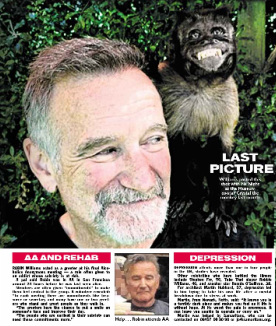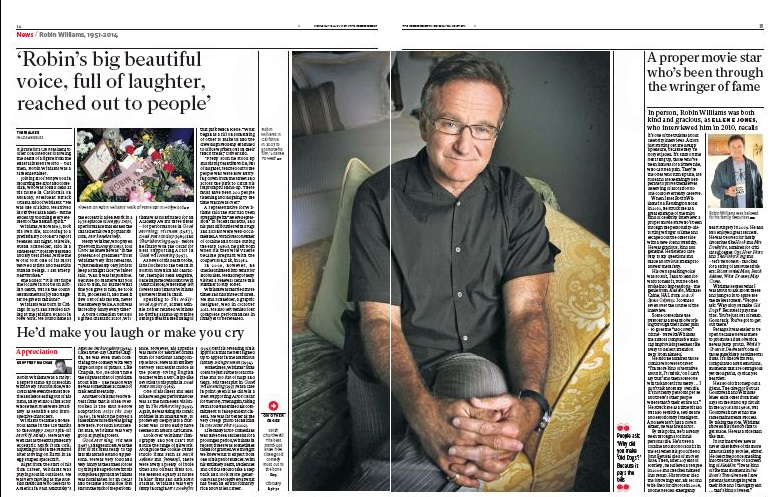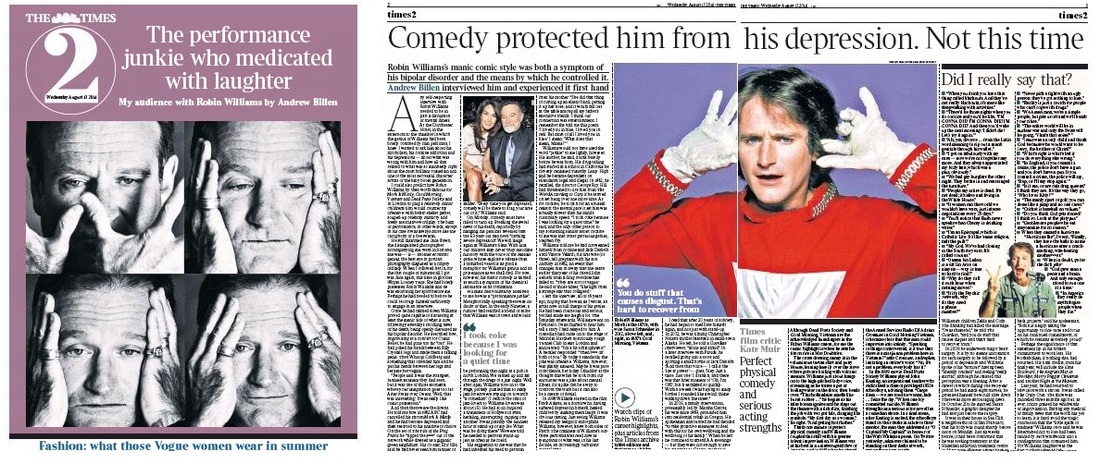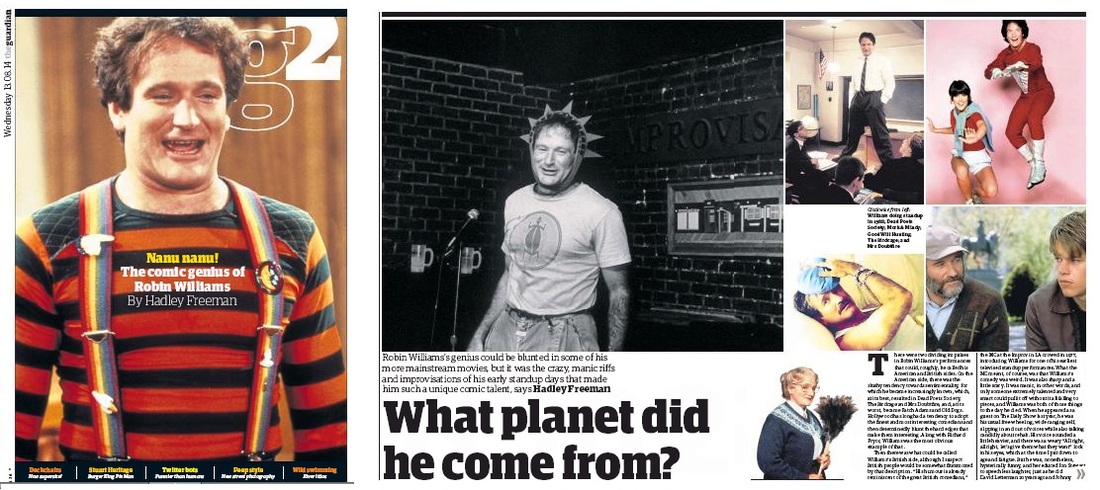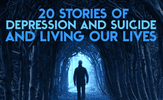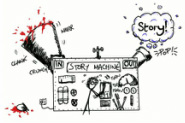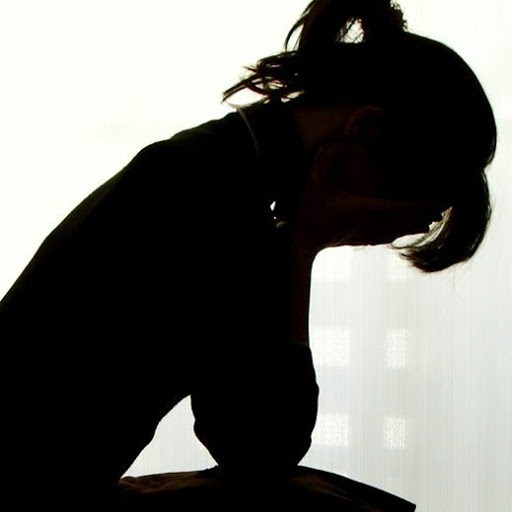Robin Williams and suicide reportingWednesday 13 August, 2014
Everyone else will do it.
It's out there. You can't put the genie back in the bottle. It's on the internet. It's on the BBC. The coroner said it, so it must be ok. We're writing for our readers, not special interest groups. The backbench want it this way. The editor insists. I was only following orders. I was only following orders, the Nuremburg defence. How many times have newspapers written that phrase with a sneer? Seven decades after the end of the Second World War, we still pursue old men for crimes allegedly committed when they were teenage German foot soldiers and poo-poo their protestations that they had no choice. We mock these children for failing to stand up to Himmler or Keitel or Jodl, yet which grown-up reporter or sub dares challenge Dacre or Dinsmore or Embley? Who dares say "We shouldn't be doing this"? Within minutes of the announcement of the death of Robin Williams people started tweeting "beware how you report this". The tweets continued through the night and all day yesterday, all the time that papers were being prepared. The mental health charity Mind issued two briefings for editors. The Samaritans' guidance on the reporting of suicide could not have been more accessible. They were just whistling in the wind. Even the tweeter who begged reporters not to give details of the method used "even if you can't stick to the rest". How can this happen? Those guidelines weren't just put together by a clutch of do-gooders in a committee room and handed down to newspapers like tablets of stone. They were produced in the light of evidence and experience and in consultation with newspaper editors. Representatives of the industry that flouted the guidelines this morning were instrumental in drawing them up. It beggars belief. Not one newspaper ran a proper factual story about depression and suicide, although some ran personal pieces on the comment pages. The Sun - yes the Sun - did the most with these little boxes on the first of its three inside spreads. The Mirror said that older men were more vulnerable. Most just offered the stock italics "If you need help.. " sentence at the end, with minimum prominence.
The Telegraph, which kept the unnecessary detail for the middle of its page 3 story, was so excited when it first became public that it immediately tweeted "Californian police have released details about Robin Williams' suicide" and a link to video footage of the assistant chief deputy coroner making a statement to the Press outside the actor's house. Yet it also posted online a remarkable personal blog by James Rhodes. How hard is it to understand that people with suicidal thoughts are vulnerable to all sorts of outside influences, and the sight of a news-stand such as today's not only could be, but is highly likely to be triggering.
We can be pretty sure that someone will see the papers and be emboldened to take their own life. They might have done so anyway, but they might also have paused, got over the moment, sought help. We will probably never know, but that doesn't make us any less culpable. The Samaritans and other organisations around the world that offer similar guidelines live in the real world; they have a clearer picture than almost any national journalist of what that's like. They know that they can't stop the reporting of a story like this that is bound to be of huge public interest, but they can do their best to minimise the collateral damage, they can point out the pitfalls. They had people on duty yesterday to help reporters, to explain why certain approaches were unhelpful and others were downright dangerous. Did anyone from any of the tabloids think to consult? Or did they just ignore the advice they were given? It is apparent from Twitter this morning that the "it's what readers want" argument doesn't hold. One of the most shared links of the day is the web address of the PCC, which has a few more days as our regulator. Here's what Paul Farmer, the Mind chief executive had to say: We’re disappointed by reporting and headlines in many of today’s newspapers which contravene good practice set out by Samaritans guidance and Mind’s own advice. And yes, it was possible to report even this very high profile death and adhere to the Samaritans' guidelines. The Independent did not even say how Williams died, let alone the materials used, simply stating that he took his own life. Yet it still found enough to fill a thoroughly readable spread.
The Times's page 3 story didn't fully meet the Samaritan gold standard, but it was relatively restrained and the paper produced an excellent cover story by Andrew Billen which explored both Williams's brilliant comedy and his mental illness and depression.
The Guardian pretty much obeyed all the rules on the news pages - starting with a personal piece by Russell Brand on the front - and fulfilled the request that positive aspects of the victim's life and work be emphasised with a G2 cover piece by Hadley Freeman, which was allowed to roam across two spreads. So it can be done. It should be done.
Newspaper offices are stressful places populated by people with big egos and big insecurities. Depression is rife within our industry. But for all the leaders and commentaries we print reiterating that it's an illness like any other, we regard it more as we would leprosy than pneumonia. We're afraid of it and afraid to admit to it. Depression brought my career in newspapers to an end and I never felt able to admit, even to my closest colleagues, why I was off sick for more than a year. What's more, I recognised others who were also suffering, others who put up a stronger fight, perhaps took stronger drugs, to keep going. We were all afraid that if we said it out in the open that we'd be regarded as broken, done-for, of no further use, unreliable. So we kept quiet, accepted the company-financed Bupa treatments and either carried on working in ashamed silence or "exited the business", as I did. It's time we put our own houses in order, helped the sufferers in our midst and stopped harming those outside - to the point where we risk our readers' lives - with our irresponsible attitudes. It's time to stand up to the bullying bosses who say it must be done this way.
|
|
Today's press release from Mind
Advice for journalists: Following the death of Robin Williams we urge journalists to avoid excessive detail about method of suicide and to report responsibly and sensitively. Evidence shows that copycat suicides can occur as a result of extensive media coverage. We strongly advise journalists to avoid explicit details and to avoid sensationalist reporting. For further advice on reporting suicide please visit the Time to Change website media advice pages We also strongly recommend the Samaritans guidelines for the reporting of suicide. Notes to editors: Mind is the leading mental health charity in England and Wales. We're here to make sure anyone with a mental health problem has somewhere to turn for advice and support. For more information, interviews or case studies please contact the Mind media team on T: 020 8522 1743 M: 07850 788514 E: [email protected] ISDN line available: 020 8221 0817 The Samaritans guidelines
Avoid explicit details of the suicide method e.g. do not state where and how an individual took their own life or what material was used (ideally, don’t report the method of suicide at all) Suicide is complex and seldom the result of a single factor, it is likely to have several inter-related causes. Avoid the placement of stories on the front page or in large headlines to guard against sensationalising the story. Do not portray a suicide as quick, effective, painless or easy. Remember that family, friends and colleagues who have been bereaved by suicide can be particularly affected by the reporting, as it may exacerbate their feelings of loss. Where possible sensitively focus on the life achievements of the person and the wastefulness of their death. If a suicide note is submitted as evidence, avoid disclosing its contents: suicide notes can provide details that sensationalise suicide and can encourage further identification with the deceased. We would be grateful if you could include details of our helpline service: Samaritans are available round-the-clock on 08457 90 90 90 [email protected] Buzzfeed staff open up
Buzzfeed is renowned for its lists. Today it came up with 20 stories of depression to offer hope. Several are anonymous, but it took courage and imagination to produce this. 
The reason the media isn’t supposed to talk about methods used is because that knowledge can turn someone who is passively suicidal into someone with an active plan.
Knowing the distances dropped, the ligatures used, the medication taken, the blades employed, all of these things can give a suicidal person the knowledge of how to actually do the deed, how to go about taking their thoughts from the realm of the hypothetical into the realm of the real. Of course, if they want, they can just Google that information, but that requires an act of will on their part; there’s a barrier that acts as another check, a moment where someone might look at what they are doing and consider other possibilities. - Mary Hamilton spells out the reasons for restraint in her Metamedia blog 
When we misuse words like "depressed" something insidious and destructive happens. They become part of our vernacular, their meaning is diluted, it becomes much harder to give weight and necessary attention to those who really are suffering from depression.
Real depression is something so serious, so life-threatening, so heavy, that it is more than disingenuous to bandy the word around lightly – it is dangerous. Robin Williams was depressed. He was so depressed he killed himself. Fame, adulation, money, love, commercial success meant nothing in the face of it. Like cancer, depression is an equal-opportunity killer - James Rhodes the pianist writing for the Daily Telegraph today L'Wren Scott's death and Mick Jagger's grief
The outrage was all about a photograph that "intruded on Mick Jagger's grief". The picture was taken in a public place and not, as the papers said, "the moment" he was told of his lover's death. It wasn't intrusive. But the suicide reporting was disgraceful 
Even people with real understanding of what you're going through add to the pressure, even though they don’t mean to. Health experts and charities say we need to raise awareness of the mental health ‘epidemic’ and get proper treatment for sufferers. A laudable objective; of course we do.
Well for some folk, being a depressive is a bit like being gay. You know there’s nothing to be ashamed of; that it’s just the way you’re made. The world shouldn’t treat you differently from anyone else and there are laws to protect you in society and in the workplace...But coming out is scary - Ven la Faxine, the Closet Depressive, August 2012 |
Please sign up for SubScribe updates
(no spam, no more than one every week or two)
|
|
|


